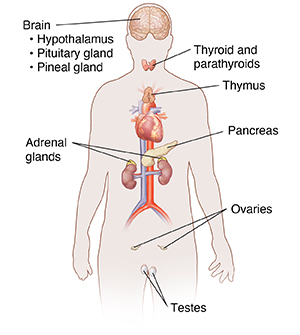A
B
C
D
E
F
G
H
I
J
K
L
M
N
O
P
Q
R
S
T
U
V
W
X
Y
Z
Topic IndexLibrary Index
Click a letter to see a list of conditions beginning with that letter.
Click 'Topic Index' to return to the index for the current topic.
Click 'Library Index' to return to the listing of all topics.
Anatomy of the Endocrine System
The endocrine system is a complex network of glands and organs. It uses hormones to control and coordinate your body's metabolism, energy level, reproduction, growth and development, and response to injury, stress, and mood. The following are key parts of the endocrine system:
-
Hypothalamus. The hypothalamus is located at the base of the brain. It makes hormones that control hormones released in the pituitary gland. The hypothalamus controls water balance, sleep, temperature, appetite, mood, reproductive behaviors, and blood pressure.
-
Pineal gland. This gland is located in the middle of the brain. It makes the hormone melatonin. This hormone helps your body know when it's time to sleep. This hormone also regulates the timing of other functions throughout the body, such as when puberty starts.
-
Pituitary gland. This gland is located below the brain. It is often as small as a pea. But it controls many functions of the other endocrine glands.
-
Thyroid and parathyroid. These glands are located in front of the neck, below the voice box (larynx). The thyroid plays a key role in the body's metabolism. The parathyroid helps regulate the body's calcium balance and bone strength.
-
Adrenal gland. An adrenal gland is located on top of each kidney. Like many glands, these work together with the hypothalamus and pituitary gland. The adrenal glands make and release corticosteroid hormones and adrenaline (epinephrine). These maintain blood pressure and regulate metabolism.
-
Pancreas. This organ is located across the back of the belly (abdomen), behind the stomach. It plays a role in digestion and hormone production. Hormones made by the pancreas include insulin and glucagon. These regulate blood sugar levels.
-
Ovaries. A woman's ovaries are located on both sides of the uterus, below the opening of the fallopian tubes. The ovaries contain the egg cells needed for reproduction. They also make estrogen and progesterone.
-
Testes. A man's testes are located in a pouch that hangs suspended outside the male body. The testes make testosterone and sperm.

Online Medical Reviewer:
Raymond Kent Turley BSN MSN RN
Online Medical Reviewer:
Rita Sather RN
Online Medical Reviewer:
Robert Hurd MD
Date Last Reviewed:
4/1/2022
© 2000-2024 The StayWell Company, LLC. All rights reserved. This information is not intended as a substitute for professional medical care. Always follow your healthcare professional's instructions.